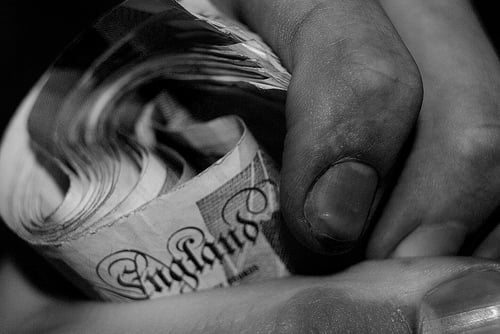

Features
With Libor fixing, the surprise is that anyone was surprised
Recent debacles in banking from various insurance mis-selling scandals (payment protection and interest rate swaps), on-going IT failures (Natwest) and Libor fixing (Barclays, the first of many), have been the natural conclusion of unfettered evolution in financial services that has been taking place since financial deregulation in 1986. Simon Leadbetter explores the inexorable rise of unethical banking and suggests it is time to do some ruthless fettering.
Banks perform a vital task in any liberal economy. They look after savers’ deposits far more effectively than stuffing cash under a mattress (no really), and then invest or lend this money wisely to earn a return for their depositors. This is retail banking and where most people’s experience with banking starts and ends.
Without the borrowing and investment that banking enables, many people would not be able to buy their homes, start or grow businesses and our economy would be a shadow of the sixth largest economy in the world that it is today. Those prudent savers who attack ‘reckless’ borrowers are attacking the very people who pay them a return and grow our economy through consumption, entrepreneurship and innovation.
Banks perform a vital task in any liberal economy
The ecosystem of banking contained many banks, building societies, mutual, friendly societies and credit unions (although an evolving group of four or five banks have dominated the current account market since first world war). The Building Societies Act 1986 allowed building societies to convert into banks. Consolidation rapidly occurred and none of the demutualised building societies remains as a standalone bank today. A sad loss when you consider that the remaining mutuals have not been heaped with the opprobrium of banks in recent years.
What was apparent to mainstream bankers after Big Bang, the 27th October 1986 when the London Stock Exchange rules were relaxed, was that simply lending and investing deposits in safe financial vehicles was a labour intensive business generating marginal returns. Investment banking, gambling on commodities, stocks, bonds, property, currency and derivatives, offered far higher returns albeit with far higher risk.
The solution was simple; close local branches and encourage telephone then online banking, outsource the more mundane operations of the bank such as dealing with customers and allow technology to replace humans, centralise operations and sack thousands of low paid banking workers, to massively lower the cost of the boring retail operation. Management time, the main scarcity in banking as they have plenty of money, could then be devoted to growing the far more exciting investment banking world.
At the same time, loss-making current account holders could be turned to profit if they could be charged exorbitant fees, aggressively sold cheap credit linked to payment protection and several other dubious financial products. Low or average income customers were to be treated like cattle and prodded every now and then to get them to go in the right direction. Personal service was reserved for those who had wealth to invest, that could feed the speculative machine.
Greed, for want of a better word, is good
Gradually the speculative financial markets became disconnected to the definite real markets. For every dollar traded in the real world, £26 is traded on speculative markets. Once it became possible to make digital money betting on the performance of gambles that speculated on the performance of further bets that occasionally had a real outcome, the vital role of retail banking in the non-financial economy was sidelined.
Gradually the speculative financial markets became disconnected to the definite real markets
The relentless bailing out of the banking sector from 2007 to date has removed any moral hazard from bankers who now know that profits from their gambling activities are theirs to keep and losses are nationalised. Markets operate in an atmosphere of fear and greed. In the current era of greed, quantitative easing and bailouts, the fear has gone entirely. A perfectly rational investment banker can still afford to take massive risks as they are using other people’s money, there is no personal risk and any downside is almost certain to be underwritten by the taxpayer.
Tragically, government and opposition parties lack the moral authority to sit in judgement of a financial service sector that lobbies them extensively (to the tune of £93m according to a July report by the Bureau of Investigative Journalism) and pays their bills (50% of Conservative funds come from the City). Nearly one in seven members of the House of Lords has paid connections with the financial sector.
But we desperately need retail banks that behave honestly, with integrity and practice plain talking – the founding principles of Barclays. We need them to lend to small businesses and households. We need them to be part of the communities in which they work so that they can understand and meet the needs of local markets, where most of our trade takes place.
We desperately need retail banks that behave honestly, with integrity and practice plain talking
The time for endless inquiries is over and that uncommon quality, common sense, must prevail. The solutions are simple.
– Crime is crime whatever the colour of a collar, so white collar bankers who have profited through deception must be given exemplary criminal sentences, just as looters were after the summer riots 2011. Personal assets must be seized to repay those that have suffered. Those guilty of a financial crime should not profit in any way. Final responsibility rests at board level so there should be no scapegoating to more junior ranks – if this means a wholesale prosecution and clearing out of boardrooms, so be it. The current cohort of directors have shown little aptitude in developing an ethical banking culture beneath them
– Retail banking plays a vital role in our economy, so investment banking must be separated from retail banking before the next election. If a retail bank fails it should be nationalised. Shareholder will take a far more aggressive role if their investment is on the line. If an investment bank fails, it should be allowed to fail
– Competition works, so big banks must be broken up more aggressively than is currently proposed to encourage far greater competition – an initial limit of 750 branches and 10% market share in current accounts would be a start – both limits would only affect the top four. It is essential that this encourages innovative new entrants rather than the growth of incumbents. This may be painful initially, but an independent commission could ensure that the banks are broken up in a way that ensures national coverage rather than cherry picking of the most affluent areas
– Sunlight is the greatest disinfectant, so there should be significantly greater transparency and public oversight with a well-staffed, well-funded regulator with uncompromising attitude and statutory investigative powers to root out financial crime and unethical behaviour
– Ever more complex regulation isn’t the solution, so financial rules need to be simplified, setting out principles of honest banking rather than the lawyer’s paradise that the current loophole-ridden system represents
In July, we will explore banking in more detail in our Guide to Sustainable Banking. In the meantime, we recommend that you read our Guide to Sustainable Investment. It explores how you can use your money to do more good and less harm, delivering a return for you and vital investment for companies that balance the needs of the planet, its people and prosperity.
Further reading:
Diamond faces grilling from parliament as public fights back
































